- Latest articles
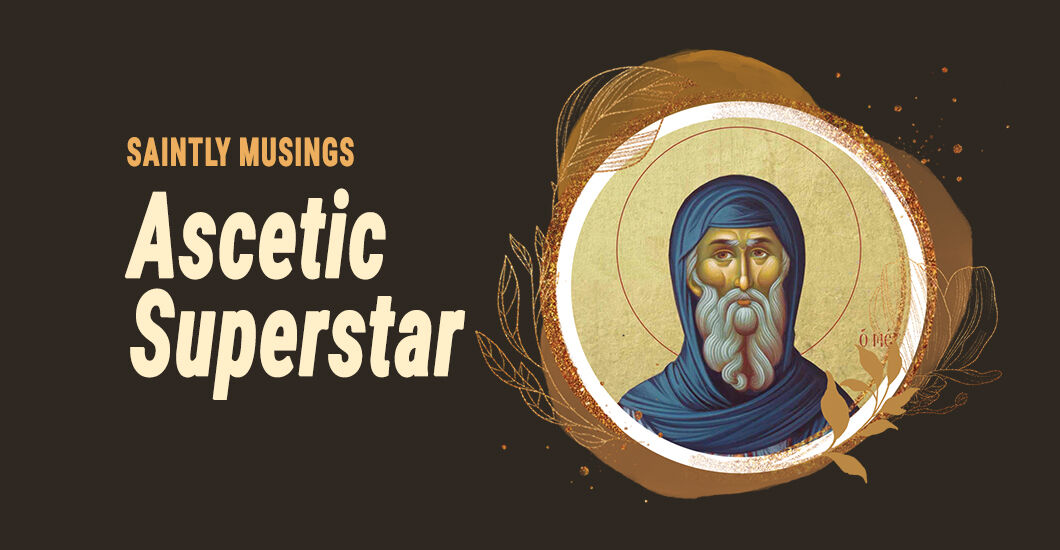
At the age of 20, Anthony lost his parents and was left with a large inheritance and the responsibility of caring for his sister. About the same time, Anthony happened to hear a reading from the Gospel of Matthew, where Jesus tells a rich young man, “If you want to be perfect, go and sell everything you have and give the money to the poor.” Anthony believed he was that rich young man. Shortly after, he gave away most of his property, sold almost everything else, and kept only what he needed to care for himself and his sister. But that’s not exactly what the Lord had commanded!
Not long afterward, Anthony was at Mass once again and heard the Gospel passage, “Do not worry about tomorrow; tomorrow will take care of itself” (Matthew 6:34). Again, he knew Jesus was speaking directly to him, so he gave away even the little he had saved, entrusted his sister to the care of some holy women, and entered the desert to live a life of poverty, solitude, prayer, and mortification.
In that harsh desert landscape, the devil attacked him in countless ways saying “Think about all the good you could have done with that money you gave away!” Firm in prayer and mortification, Anthony fought off the devil and his manifestations. Many were attracted to his wisdom, and these he encouraged to seek self-denial and the hermetic life. No wonder after his death he became Saint Anthony the Great or Saint Anthony of the Desert, the father of Christian Monasticism.
Once a brother renounced the world and gave his goods to the poor, but he kept back a little for his personal expenses. He went to see Abba Antony. When he told him this, the old man said to him, “If you want to be a monk, go into the village, buy some meat, cover your naked body with it and come here like that.” The brother did so, and the dogs and birds tore at his flesh. When he came back the old man asked him whether he had followed his advice. He showed him his wounded body, and Saint Antony said, “Those who renounce the world but want to keep something for themselves are torn in this way by the demons who make war on them.”
'
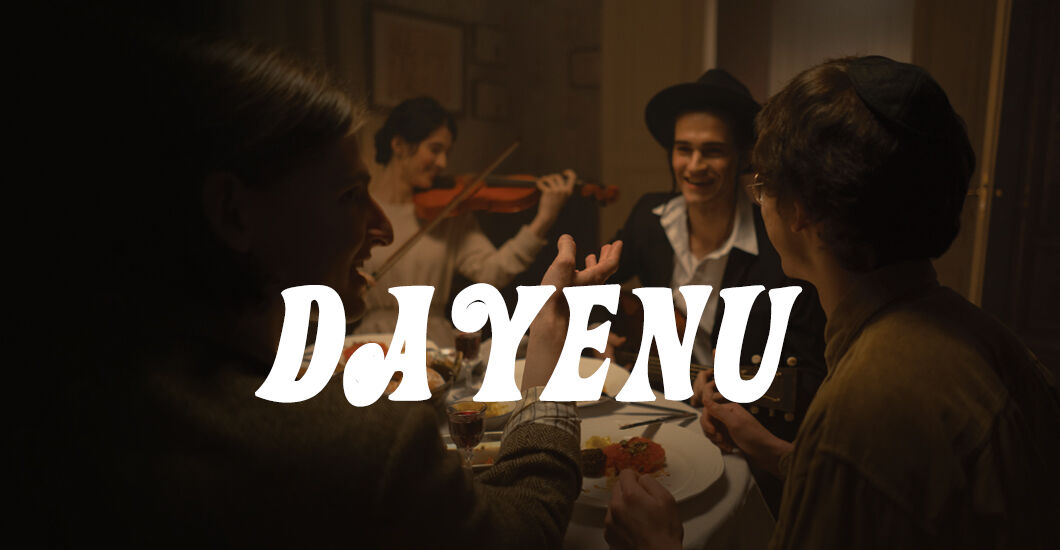
Are you in search of something more in your life? Get hold of this key to unlock the mystery.
Every Holy Saturday, in preparation for Easter, our family celebrates a Christian version of the Seder Meal. We eat lamb, charoset, bitter herbs and we pray some of the ancient prayers of the Jewish people.
‘Dayenu’ a lively song that recounts God’s kindnesses and mercy during the Exodus, is a key part of the Passover Seder. The word “Dayenu” is a Hebrew term meaning “it would have been enough for us,” or “it would have sufficed.” The song reviews the events of the Exodus and proclaims, “Had God carried us out of Egypt and not carried out judgments against the Egyptians, Dayenu! That would have been enough. Had He carried out judgments against them, and not against their idols…Dayenu, etc. Any one of God’s mercies would have been sufficient. But He gave us all of them!
Like many of us, I spent most of my youth in endless search for something that sufficed or satisfied. There was always this unquenchable longing—a feeling that there was ‘something more’ out there, yet I could never quite grasp what, where, or who it was. I chased after the typical American dreams of good grades, exciting opportunities, true love, and a fulfilling career. But all of these left me feeling unfulfilled.
When I Found Him
I remember when I finally found what I was looking for. I was 22 and I met authentic Christians who were actively seeking to follow Jesus. Their influence helped me more fully embrace my own Christian faith, and I finally found that peace I was craving. Jesus was the One I was looking for.
I found Him while serving others, while worshiping Him, walking amidst His people, reading His Word, and doing His Will.
I realized for the first time that my faith was so much more than a Sunday obligation. I realized I was constantly in the good company of a God who cared for me and wanted me to care for others. I wanted to learn more about this Loving God. I cracked open my dusty Bible. I went on a mission trip to Cameroon, Africa. I spent a year living in solidarity with the poor at a Catholic Worker House.
The ‘Peace of Christ which surpasses all understanding’ surrounded me and would not let me go. I was so enveloped by the Love of Jesus that people would randomly come up to me and ask why I was peaceful, and sometimes actually follow me around.
Mary, the Blessed Mother of my Lord, and Savior, guided my every step. The Rosary and daily Mass became indispensable parts of my spiritual diet and I clung to both Mary and Jesus as if my very life depended on it.
However, somewhere over the next phase of my life, I lost this sense of Dayenu, the sense of satisfaction and the deep peace that surpasses all understanding. I can’t say exactly how or when. It was gradual. Somehow, while leading an active life raising five children and returning to the workforce, I got caught up in the busyness of life. I thought I needed to fill every waking moment with productivity. It wasn’t a good day unless I accomplished something, or several somethings.
Pockets of Silence
Now that my five children are mostly raised, I am still tempted to jump full force back into the world and fill every waking hour with tasks. But the Lord keeps tugging at my heart to spend more time with Him and purposefully create pockets of silence in my day so that I can hear His Voice clearly.
To actively guard my mind and heart from the noise of the world I’ve developed a routine that helps me stay in touch with God. Each morning, the first thing I do (after attending to essentials like coffee and seeing children off to school) is to pray the daily Mass readings, go on a Rosary walk, and attend daily Mass. Bible. Rosary. Eucharist. That routine is what brings me peace and focuses me on how to spend the rest of my day. Sometimes certain people, issues, and various tasks come to mind while praying, and I make a point (later in the day) to reach out to or pray for that person, pray over that concern, or complete that task. I simply listen to God, and I act on what I believe He is asking of me that day.
No day is the same. Some days are much fuller than others. I do not always respond as quickly as I could or love as much as I should. But I offer the Lord all my prayers, works, joys, and sufferings at the beginning of each day. I forgive others for their transgressions, and I repent of any failings at the end of each day.
My goal is to know deep in my heart that I have been a good and faithful servant and that my Lord is pleased with me. When I feel the Lord’s pleasure, I find deep, lasting peace.
And Dayenu…that is enough!
'

Making the right decision is pivotal; What’s your choice?
Forty years ago, Bob Dylan immersed himself in exploring Christianity, which was evident in his Slow Train Coming album (1979). In the following lyrics, Dylan asks the question ’To whom do you give your ultimate allegiance?’:
“Yes, you’re goin’ to have to serve somebody.
Well, it may be the Devil or it may be the Lord,
But you’re gonna have to serve somebody.”
We can’t avoid this question because we are in fact constituted “to serve somebody.” Why is that? Why can’t we just drift along from one experience to another without giving our allegiance to anything or anyone? The answer comes from our human nature: we have a Mind (reflective consciousness) and a Will (that which desires the good). Our Mind has the inherent capacity to seek meaning in our human existence. Unlike other creatures, we don’t simply experience; rather, we take a step back and interpret, we give meaning to what just transpired. In our process of making meaning from our experiences, we must face Dylan’s question: Whom will I serve?
Heading for a Dead End?
Jesus, as was his custom, simplifies the choice when he says, “No one can serve two masters. He will either hate one and love the other or be devoted to one and despise the other. You cannot serve God and mammon” (emphasis added; Matthew 6:24).
Jesus knows that we either seek fulfillment by being in relationship with God, the source of our being, or we seek happiness apart from God. We can’t have it both ways: “…it may be the Devil or it may be the Lord, but you’re gonna have to serve somebody.” The choice we make determines our destiny.
When we give our allegiance to ‘mammon’ we reject our True Self, which is meant to be in genuine relationship with God and neighbor. In choosing ‘mammon’ we shift to a consuming self, which finds its identity in property, prestige, power, and pleasure. When we do this, we objectify ourselves. In contemporary terms, we call this the ‘commodification of the Self.’ In other words, we are what we possess.
The path of property, prestige, power, and pleasure leads to a dead end. Why? Because they are…
– scarce—not everyone has access to wealth, acclaim, pleasure, and power. If having the goods of the world is the gateway to happiness, then most human beings have no chance at happiness.
– exclusive–which is a consequence of their scarcity. Life becomes a zero-sum game with society divided into the ‘haves’ and ‘have nots.’ As Bruce Springsteen sings in his song “Atlantic City”: “Down here it’s just winners and losers and Don’t get caught on the wrong side of that line.”
– transitory–which means our needs and wants change; we never reach an endpoint because there’s always something else out there to desire.
– ephemeral–their chief drawback is superficiality. While materialism, acclaim, status, and being in control can satisfy us for a time, they don’t address our deepest yearning. In the end, they pass away: “Vanity of vanities! All things are vanity” (Ecclesiastes 1:2b).
True Identity
Pursuingthe riches and pleasures of this worldcan have devastating psychological and spiritual implications. If my self-worth depends on my possessions and achievements, then lacking the latest gadgets or experiencing some failure means I not only have less than othersdo or that I have failed in some effort, but that I have failed as a person. Comparing ourselves to others and expecting perfection of ourselves explains the anxiety experienced by so many young people today. And as we age and become less productive,we can lose our sense of usefulness and self-worth.
Jesus tells us that our other alternative is to “serve the Lord” who is Life itself and who wants to share His Life with us so we can become like Him and reflect the wonder of his being. The False Self, the Old Self, the Commodified Self leads to self-absorption and spiritual death. But by “serving the Lord” we enter into His very Being. The New Self, the True Self is Christ living in us; it’s the self that is ordered to love because, as Saint John reminds us, “God is love” (1 John 4:7b). Saint Paul adds that when we have that True Self, we are being renewed in the image of our Creator (Colossians 3:1-4).
Knowing who we are makes it much easier to know what to do. Who we are matters infinitely more than what we have because knowing who we are tells us what to do.We are God’s beloved children created to rest God’s love. If we focus on that truth, knowing who to serve is no longer a difficult decision. Echoing Joshua, we can confidently say, “As for me and my house, we will serve the Lord” (Joshua 24:15).
'

Ever wondered why bad things happen in life? The reason may surprise you
Often, when we are faced with severe trials and sufferings, we are tempted to blame God: “Why is God doing this to me,” or “Why does a loving God not come immediately to my aid?” In the process, we conveniently forget the Bible tells us that there is also a mysterious evil Force at work in our world whose only purpose is “to steal and kill and destroy” (John 10:10). Jesus called this evil power the Devil and described him as “a murderer from the beginning… a liar, and the father of lies” (John 8:44).
“An enemy has done this” (Matthew 13:28). Jesus specifically taught us that we must never blame His/our “Abba” for our sufferings! In His insightful parable, when questioned by the servants about the appearance of weeds among the good wheat given them to sow, the Master replied categorically, “Some enemy has done this, not I.”
Choose Your Victory
God is not a moody, tyrannical, or uncaring deity who causes cancers and marital breakdowns and tsunamis to plague His beloved children! The cause lies in the mysterious spiritual battle raging between the forces of Good and the forces of Evil that involves every human being! The precious gift of free will, given to us by the Creator, allows each of us “to choose life or to choose death” (Deuteronomy 30:15-20), to stay happily on the side of Good or to cross over to the Enemy’s side.
And this choosing is done not only by individuals, but by systems as well. In addition to individual sin, there is systemic sin—well-organized oppressive systems and institutions which perpetuate social injustice and religious persecution. The Bible tells us that Jesus has won the victory over all the Forces of Evil, and that in the “new heaven and new earth” (Revelation 21, 22) whatever turned creation away from its original purpose will be destroyed for the sake of the new creation, which will fulfill the Lord’s prayer: ‘Thy Kingdom Come’.
In his 1986 Encyclical Letter on the Holy Spirit, Saint John Paul II explained this cosmic spiritual warfare when he explained how the sin of Adam and Eve allowed “the perverse genius of suspicion” into the world. This apt phrase expresses correctly that the Enemy is a genius (as a fallen angel, his intelligence is superior to ours), but a perverse genius (he uses his intelligence for evil purposes rather than for good), and his (successful) strategy has been to sow suspicion in the minds of God’s creatures (us!) against God the Creator Himself! The real Enemy goes scot-free:
“For in spite of all the witness of creation, the spirit of darkness is capable of showing God as an enemy of His own creature, and in the first place as an enemy of man. In this way, Satan manages to sow in man’s soul the seed of opposition to the One, who from the beginning would be considered as man’s enemy—and not as Father. This analysis of sin indicates that throughout the history of humanity there will be a constant pressure on man to reject God, even to the point of hating Him. Man will be inclined to see in God primarily a limitation of himself, and not the source of his own freedom and fullness of good” (Dominum et vivificantem, n.38).
Reason for Suspicion
Don’t our own personal experiences bear this out? Throughout history, a constant pressure has indeed been exerted on humanity to suspect God! And because of this, Saint John Paul II explains, “there is in the depths of God an unimaginable and inexpressible pain. This inscrutable and indescribable fatherly ‘pain’ will bring about, above all, the wonderful economy of redemptive love in Jesus Christ, so that love can reveal itself in human history as stronger than sin” (Dominum et vivificantem, n.39).
When I was the Parish Priest at Holy Family Church, Mumbai, I was surprised to learn that I was expected to insure my church against God! The insurance contract which I had to renew, contained this line: “We insure this building against floods, fires, earthquakes and such acts of God!” I protested to the agent that my God, the God revealed by Jesus Christ, could never be blamed for natural calamities, but was instead a God of surpassing love. (I eventually signed the contract, but only after crossing out the offending words).
The incident taught me how a “perverse suspicion of God” has become so ingrained in human customs and traditions that a good God gets represented as a moody, tyrannical deity! Instead of recognizing that the cause of the misery and suffering that plagues our world is man’s refusal to be an obedient steward of God’s creation (see Genesis 1:28) the secular (and often even the religious) world prefers to make God the scapegoat for everything amiss!
However, we cannot blame God for our human ills resulting from global warming, terrorism, wars, poverty, unforgiveness, contagious diseases, etc. On the contrary, from the mystery of His own Son’s terrible crucifixion and resurrection, we must conclude that God always desires our good, and that “wherever evil abounds, His grace super-abounds” (Romans 5:20).
There is a spiritual battle being waged imperceptibly between the forces of Good and the forces of Evil. Even in 2023, humanity needs to be reminded that, despite all its technological progress and scientific achievements, this spiritual battle continues, and involves every human being!
“For we are not contending against flesh and blood, but against the principalities, against the powers, against the world rulers of this present darkness, against the spiritual hosts of wickedness in the heavenly places” (Ephesians 6:12).
So please, let’s put the blame where it belongs and never blame Jesus’ and God, our Father!
'
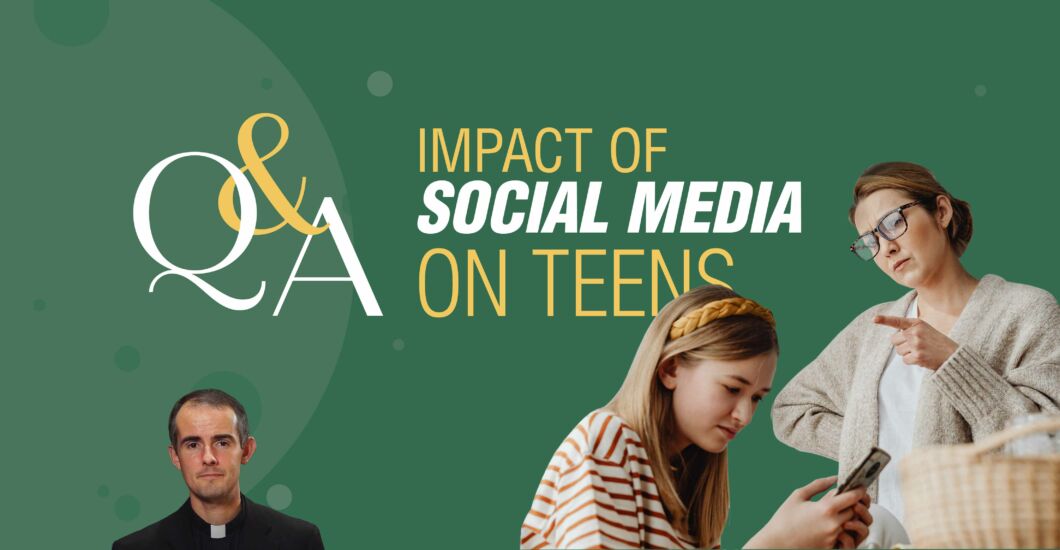
Q – My pre-teens are clamoring for a phone so they can get social media, like all of their friends. I feel so torn, because I don’t want them to be left out, but I know how dangerous it can be. What is your opinion?
A: Social media can be used for good. I know a twelve-year-old who makes short Bible reflections on TikTok, and he gets hundreds of views. Another young person I know has an Instagram account dedicated to posting about the saints. Other teens I know go on Discord or other chat rooms to debate atheists or to encourage other young people in their Faith. Without a doubt, there are good uses for social media in evangelization and forming Christian community.
And yet…do the benefits outweigh the risks? A good maxim in the spiritual life is: “Trust God immensely…never trust yourself!” Should we entrust a young person with unfettered access to the internet? Even if they start out with the best of intentions, are they strong enough to resist the temptations? Social media can be a cesspool—not just obvious temptations like pornography or glorifying violence, but even more insidious temptations like gender ideology, bullying, becoming addicted to the “high” of getting likes and views, and feelings of inadequacy when teens start to compare themselves with others on social media. In my opinion, the risks outweigh the benefits of allowing young people access to a secular world which will try to form them away from the mind of Christ.
Recently a mother and I were discussing her teenage daughter’s poor behavior and attitude, which was correlated to her use of TikTok and her unfettered access to the internet. The mother said with a sigh of resignation, “It’s just so sad that teens are so addicted to their phones…but what can you do?”
What can you do? You can be a parent! Yes, I know peer pressure is tremendous to allow your kids a phone or device with endless free access to all the worst humanity has to offer (aka social media) – but as a parent your job is to form your children to be saints. Their souls are in your hands. We must be that first line of defense against the dangersof the world. We would never allow them to spend time with apedophile; if we knew they were being bullied we would try to protect them; if something were harming their health, we would spare no expense to rush them to the doctor. Then why wouldwe allow them a window into the cesspool of porn, hatred, and time-wasting trash that’s readily available on the internet without offering careful guidance? Study after study has shown the negative effects of the internet in general—and social media in particular—but still we turn a blind eye and wonder why our teenage sons and daughters struggle with identity crises, depression, self-hatred, addictions, aberrant behavior, laziness, a lack of desire for holiness!
Parents, do not abdicate your authority and your responsibility! At the end of your lives, the Lord will ask you how well you shepherded these souls He entrusted to you—whether or not you led them to Heaven and preserved their souls from sin to the best of your ability. We cannot use the excuse, “Oh, well everyone else’s kids have one, so my kid would be strange if they didn’t!
Will your kids be angry with you, maybe even say they hate you, if you put restrictions on their devices? Probably. But their anger will be temporary—their gratitude will be eternal. Recently another friend who travels the country speaking about the dangers of social media told me that after her talk she always has many young adults come up to her with one of two reactions: “At the time I was furious with my parents for taking away my phone, but now I’m grateful.” OR “I really wish my parents had protected me from losing so much innocence.” No one has ever been grateful that their parents were so permissive!
So, what can be done? First, do not give teens (or younger!) phones with internet or apps. There are plenty of dumb phones still in existence! If you must give them phones that access the internet, put parental restrictions on them. Install Covenant Eyes on your son’s phones—and on your home computers while you’re at it (almost every Confession I hear involves pornography, which is mortally sinful and can lead your son to view women as nothing but objects, which will have huge ramifications on his future relationships). Do not allow them to use their screens at meals or while alone in their bedrooms. Get the support of other families who have the same policies. Most importantly—do not try to be your kid’s friend, but be their parent. Authentic love requires boundaries, discipline, and sacrifice.
Your kid’s eternal welfare is worth it, so do not say, “Alas, I can’t do anything—my kid needs to fit in.” It’s better to stand out here on earth so we can fit into the Communion of Saints!
'
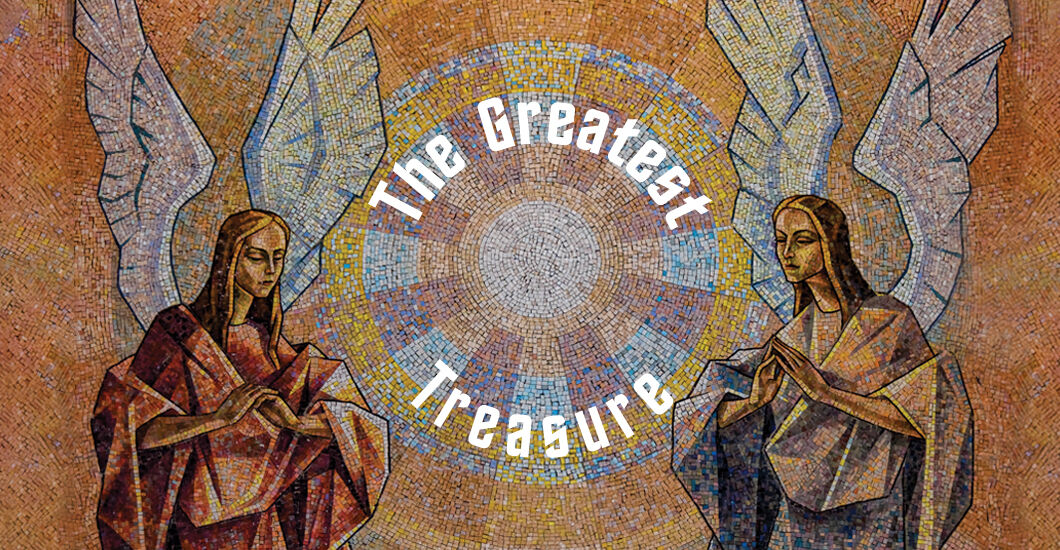
The world’s greatest treasure is within the reach of every person!
The reality of Jesus’ presence in the Eucharist is something great and marvelous. I know that Jesus is really and truly present in the Eucharist from my own experience not just because the Church teaches this truth.
The First Touch
One of the experiences I had that helped increase my faith in the Lord was after I was baptized in the Holy Spirit in my early days in the Catholic Charismatic renewal. I was still not a priest at that time. I was leading a prayer meeting and during this meeting, we were praying over people. We had the Eucharist exposed for Adoration and then people would come one by one to be prayed over.
A woman came asking me to pray over her with folded hands and I thought she was praying. She asked me to pray for her husband who had a problem with his foot. But as I was praying, I felt in my heart that the Lord wanted to heal her. So I asked her if she needed any kind of physical healing. She told me, “My hands are like this because I have frozen shoulder.” She had a problem of mobility with her hands. As we were praying for her healing she said that a great heat came out from the Eucharist, descended on her frozen shoulder and she was healed then and there.
That was the first time I actually saw such healing taking place through the power of the Eucharist. It’s exactly as we have in the Gospels—people touched Jesus and power came out of Him and healed them.
Unforgettable Moment
I have had another powerful experience of the Eucharist in my life. Once I was praying with somebody who was involved in the occult, and she needed a deliverance. We were praying as a group and there was a priest with us. But this woman, who was on the floor couldn’t see the priest who was bringing the Eucharist inside the church to the sacristy. The exact moment the priest brought the Eucharist, from her mouth, a male violent voice said these words: “Remove Him whom you’ve got in your hands!” It choked me because the demon did not say ‘it’- a piece of bread, but “Him”. Satan recognizes the living presence of Jesus in the Eucharist. I will never forget that moment of my life. When I became a priest later, I kept those two incidences in my heart to really believe and preach the Real Presence of Jesus in the Eucharist.
Unspeakable Joy
As a priest I had one another experience which I will not forget. I attend prison ministry when I am not preaching around. Once I was giving communion to a particular division in the prison and had the Eucharist with me. Suddenly I felt in my heart the joy of Jesus in giving himself to the prisoners. This is something I cannot explain to you. If you could only experience and know the joy Jesus has in the Eucharist to come into each and every one of us!
Another experience I have had of the Blessed Sacrament was a personal, emotional healing for myself. Once somebody who was in the church really hurt me with his words. It wasn’t easy and I was starting to get angry. Although I am not aggressive by nature, this hurt stirred up a lot of feelings and bad thoughts against this person. I fled to Jesus in the Blessed Sacrament and just cried. In that moment I felt His love, for that person who hurt me, radiating out from the Eucharist and entering into my heart. Jesus in the Eucharist healed me, but more than that, as a priest it helped me to realize where the real source of love and healing is in our lives.
Not only for me as a priest, but for married persons and young people – who can really give the love that we are looking for? Where can we find love that is greater than sin and hatred? It’s in Him, present in the Eucharist. The Lord gave me so much love for the person who hurt me.
On the eve of the day I was going to make my first vows, a sudden darkness entered into my heart. I went straight to the tabernacle instead of finding my new room in the community. Then from the depths of the heart I heard the Lord telling me, “Hayden, you are coming here for me.” And suddenly all the joy came back. In the Eucharist Jesus taught me one very important thing about my life as a Franciscan priest—He has called me for Him, I exist for Him. The Eucharist teaches every one of us that we can do nothing apart from Jesus—it’s not about us, it’s JUST ABOUT HIM. We are in the Church to be with Him!
As a priest, celebrating the Eucharist is the most wonderful moment I have with the Lord and it also brings me closer to the Christian community. It is Jesus in the Eucharist who is the source of communion between us. As a priest, I cannot live without the Eucharist. What is the greatest thing we can ask Jesus when we receive Him in our hearts? It is asking Him to fill us with His Holy Spirit once again. When Jesus was resurrected, He breathed the Holy Spirit into the Apostles. When we receive Jesus in the Eucharist, He gives us once again the presence and power of the Holy Spirit in our lives. Ask Him to fill you with the gifts and the power of the Holy Spirit.
Broken for you
Once when I was lifting up the Host and breaking it, I got this deep conviction regarding the priesthood. We look at the people through the presence of Christ in the Eucharist, which is a broken body. A priest should be like that. He breaks his life so that he can give it to the community and the rest of world. One can also discover this beauty in the married life. Love is like the Eucharist. You have to break yourself in order to give yourself. The Eucharist has taught me how to live a celibate life, how to be Jesus for the community, giving my whole life for them. The same thing has to happen in married life.
Finally, I can tell you that whenever I have felt lonely or down, just going near him—is enough to receive all the strength that I need, even if I am tired or sleepy. I can’t count the number of times I have experienced this in my travels and in my preaching. The best rest is to get closer to Him. I can assure you; He can renew us physically, spiritually, mentally and emotionally. Because in the Eucharist Jesus is ALIVE—He is there for us!
'
Today if you clearly hear what God wants you to do…dare to do it!
“Become a monk first.” Those were the words I received from God when I was 21 years old; 21 years old with the sort of plans and interests that would be expected of an average 21-year-old. I had plans to graduate from college within a year. Plans to serve in youth ministry, while working as a stuntman in Hollywood. I fancied I might move to the Philippines one day, and spend some time living among tribes on a remote island. And of course, marriage and children had a very strong appeal. These aspirations among others were arrested swiftly when God spoke those four unmistakable words. Some enthusiastic Christians express envy when I tell them about how God made His will explicit for my life. They often say, “I wish God would speak to me that way.” In response to this, I wish to offer some clarification on God’s pattern of speech based on my personal experience.
God does not speak until we are ready to hear and receive what He has to say. What He has to say may determine how long it takes before we are ready. Until we can hear and receive God’s word, He will simply wait; and God can wait a very long time, as illustrated in the parable of the Prodigal Son. More importantly, those who wait on Him are esteemed throughout Scripture. I should preface my calling to become a monk with details about how my vocation really began, when I started reading the Church Fathers as an adolescent, or more accurately, when I started reading the Bible daily. Factoring in these details shows that it took seven years of discernment before I could receive just four words from God.
Digging into Books
I hated reading as a child. Sitting in a stuffy room with a book for hours on end made no sense when endless adventures were lying just outside my door. However, the imperative to read my Bible daily posed an unresolvable dilemma. Every Evangelical knows that any Christian who allows dust to collect on the Good Book is not much of a Christian. But how could I study Sacred Scripture as someone who hated reading? By the influence and example of a youth pastor, I gritted my teeth and set myself to the task of laboring over God’s Word one book at a time. The more I read, the more I began to ask questions. More questions led me to reading more books for more answers.
Teenagers are intense by nature. Subtlety is something they learn later in life, which is why the Church Fathers left me so enamored as a young man. Ignatius was not subtle. Origen was not refined. The Church Fathers were extreme in every sense, renouncing earthly goods, residing in the desert, and often sacrificing their lives for the Lord. As an adolescent with proclivities toward the extreme, I found no one who could rival the Church Fathers. No MMA fighter could compare with Perpetua. No surfer was gnarlier than the Shepherd of Hermas. And yet, what these early radicals cared about was nothing other than imitating the life of Christ as modeled in the Bible. Furthermore, all were in consensus on leading a life of celibacy and contemplation. The paradox was striking to me. Being extreme like the Church Fathers entailed a lifestyle that, on the surface, appeared rather mundane. More questions to ponder.
Talking Back
With graduation on the horizon, I was torn by a couple job offers that would determine denominational affiliation, as well as prospective institutions for further education after college. At the time, my Anglican priest advised me to bring the matter to God in prayer. How I should serve Him was ultimately His decision, not mine. And what better place to discern the will of God in prayer than a monastery? On Easter Sunday, a woman I had never met approached me at St. Andrew’s Abbey, saying “I am praying for you, and I love you.” After asking for my name, she advised me to read the first chapter of Luke, saying “this will help you determine your vocation.” I kindly thanked her, and did as she instructed. As I sat on the chapel lawn reading about John the Baptist’s origin story, I noticed several parallels between our lives. I will not stray into all the details here. All I will say is that it was the most intimate experience I ever had with God’s Word. It felt like the passage was written for me in that very moment.
I continued to pray and wait for God’s direction on the grassy lawn. Would He direct me to accepting a position in Newport Beach, or back home in San Pedro? Hours passed by as I patiently listened. Suddenly, an unexpected voice popped in my mind; “Become a monk first.” This was startling, as it was not the answer I was looking for. Entering a monastery after graduation was the last thing on my mind. Besides, I had a vibrant and colorful life to live. I stubbornly pushed God’s voice aside, attributing it to be some wild idea that rose from my subconsciousness. Returning to prayer, I listened for God to make His will evident to me. Next, an image captured my mind; three dry river beds appeared. Somehow, I knew that one represented San Pedro my hometown, another represented Newport, but the river bed in the middle signified becoming a monk. Against my will, the riverbed in the middle began overflowing with white water. What I saw was completely out of my control; I couldn’t not see it. At this point I became afraid. Either I was going mad, or God was calling me to something unexpected.
Undeniable
The bell tolled as tears trickled down my cheeks. It was time for Vespers. I shuffled into the chapel along with the monks. As we chanted the Psalms, my weeping grew uncontrollable. I could no longer keep up with the chanting. I remember feeling embarrassed about the mess I must have looked like. As the brethren filed out one by one, I remained in the chapel.
Lying prostrate in front of the altar, I began to weep harder than I ever have in my entire life. What felt strange was the complete lack of emotion to accompany the weeping. There was neither sorrow nor anger, just sobs. The only explanation I could attribute to the downpour of tears and snot, was the touch of the Holy Spirit. It was undeniable that God was calling me to the monastic life. I went to bed that night with eyes swollen but peace knowing God’s path for me. The next morning I promised God I would follow His bidding, seeking to become a monk first and foremost.
I am Not Done Yet?
Although God is punctual at times, as with Moses on Mt. Sinai or Elijah on Mt. Carmel, more often than not, His words are inopportune. We can’t presume that by putting our lives on hold, God will be forced to speak up. He is not manipulatable in the slightest. Thus, we are left with no choice but to carry on with our humdrum tasks until we nearly forget about Him—this is when He shows up. Young Samuel heard God’s voice precisely when Samuel was attending to his daily (mundane) duties, i.e., ensuring the tabernacle candle remain lit. There are vocations within vocations; callings within callings. Thus, a student may very well hear God speak in the middle of attending to her algebra problem. A single mother may receive a word from God while quietly sitting in traffic on the 405 freeway. The point is to watch and wait always, for we do not know when the Master will appear. This gives rise to a question; Why is a word from God so infrequent and ambiguous?
God gives us just the amount of clarity we need to follow Him; no more. The Mother of God received a word without much clarification. The prophets, who constantly received revelations from Him, were often perplexed. John the Baptist, who was the first to recognize the Messiah, second guessed himself later on. Even the disciples, Jesus’ closest kin, were constantly confused by the words of our Lord. Those who hear God speak are left with more questions, not answers. God told me to become a monk, but He did not say how or where. Much of my own vocation He left up to me to figure out. It would take four years before my calling was realized; four years (within which I visited eighteen other monasteries) before I was granted entry to St. Andrew’s. Confusion, doubt, and second guessing, are all part of the lengthy process of discernment. Moreover, God does not speak in a vacuum. His words are preceded and followed by the words of others. A youth pastor, an Anglican priest, an oblate of St. Andrew’s—these acted as God’s vassals. Hearing their words was essential before I could receive God’s.
My vocation remains incomplete. It is still being discovered, still being realized every day. I’ve been a monk for six years now. Just this year I professed solemn vows. One might say I’ve done what God told me to do. Be that as it may, God is not done speaking. He did not stop speaking after the first day of Creation, and He will not stop until His magnum opus is complete. Who knows what He will say or when He will speak next? God has a history of having very strange things to say. Our part is to watch and wait for whatever He has in store.
'
“Have mercy on me, O Lord, a sinner.”
These words have been the battle cry of my life. Even in my earliest years, they were my motto, when I didn’t even realize.
Mercy. If God had a middle name, it would be “Mercy”.
Mercy held my hand every time I walked into the confessional.
Mercy saved me time and time again, while enveloping my soul and pardoning me.
My faith journey began decades ago when my parents chose for me what I couldn’t yet choose for myself—baptism into the Catholic Church.
I was raised to know right from wrong. And I suffered the consequences when I veered off track. My parents took their roles seriously and took pride in teaching me about Jesus and the Church. They were God’s hands in my life, forming my conscience through His grace.
As I grew, I hungered and thirsted for more of Him. Yet, the world and my own struggles with fear and anxiety got in the way.
Vacillation between good and bad plagued my life for years. I called it “walking a tightrope between heaven and hell.” During college, I recall standing drunk at 1 AM in a bar bathroom, downing my drink while I prayed the Rosary, afraid that I would miss even a day of praying it.
As I look back on moments like this that illustrated my internal tug of war, I am reminded of Mercy. I knew who I belonged to, but I was tempted to wander.
An innate struggle caused by original sin permeates our lives whether we can name it or not:
Our deepest desire for Christ is opposed by the allurements of the world and the evil one.
Yet Mercy has pulled me out of the gutter of sin, cleaned me of the muck and washed me anew.
Mercy has waited for my call, sitting by the phone at all hours of the night until I was ready to be picked up and brought home.
Mercy has pulled me from going under, supporting me like a life vest.
Mercy has listened to the screaming, the tears, the angry words, and held me close as I settled.
Mercy has held me patiently as I fought back again and again.
Mercy is the end. The beginning. My everything in between.
The God of Mercy has waited for me, pursued me, and forgiven me for as long as I have known him.
And by His grace, He has assured me that He is always there, arms outstretched, loving and forgiving again and again.
'
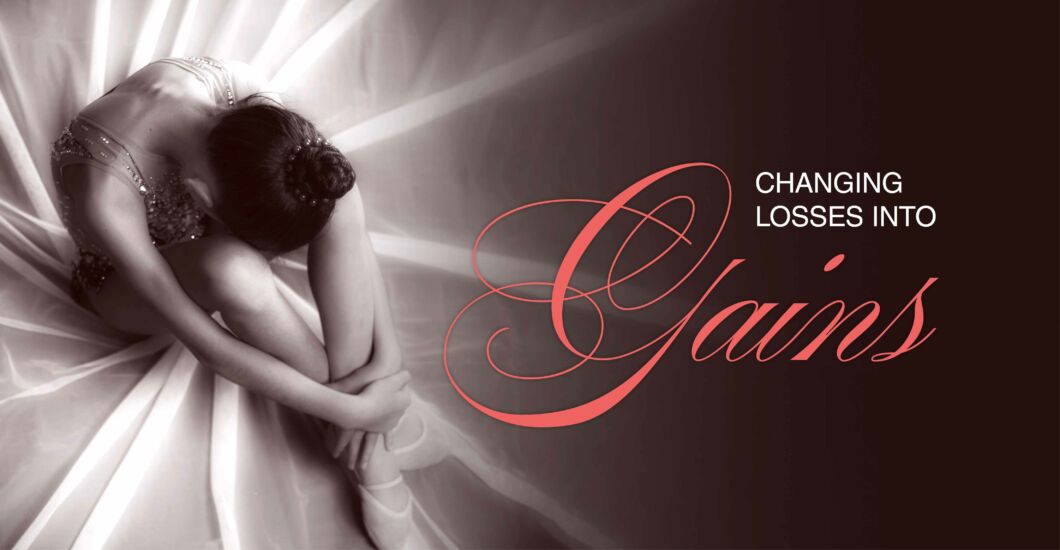
When troubles come, how quick are we to think that nobody understands what we are going through?
In almost every church, we find a crucifix hanging above the altar. This image of our Savior does not present Him crowned with jewels sitting on a throne, nor descending on a cloud carried by angels, but rather as a man, wounded, stripped of basic human dignity, and enduring the most humiliating and painful form of execution. We see a person who has loved and lost, who has been hurt and betrayed. We see a person just like us.
And yet, in the face of this evidence, when we ourselves suffer, how quick we are to lament that nobody understands us, nobody knows what we’re going through? We make quick assumptions and sink into a place of isolation bound by inconsolable sorrow.
A Change of Course
A few years ago my life changed forever. I had always been a healthy child, a ballet dancer with dreams I had already begun to realize by the time I turned twelve. I had regularly attended Sunday school and felt drawn to God but had never done much about it, so I went on enjoying my life, my time with friends, and dancing lead roles at top ballet schools. I was content with my life. I knew God was there, but He was always over there. I trusted Him, but never thought very much about Him.
Yet in eighth grade, at the peak of my childhood dance career, my health started to plummet, and four years later I still have not recovered. It all began just one week after performing in a ballet at the Metropolitan Opera House, the day after I received the sacrament of Confirmation, and two weeks before I was to attend a summer intensive at the second most prestigious dance school in the United States. A bad strain of ligaments in my foot aggravated a previously undiscovered break in my ankle bone which now required surgery. Then I developed appendicitis, requiring another surgery. The two surgeries in close succession caused severe damage to my neurological and immune systems and weakened me to a point that no doctor could treat or even fully understand my situation.
As I continued to push my body to continue ballet, my body pushed back and I ended up fracturing my spine, ending my ballet career.
Throughout the year leading up to my Confirmation, I experienced Jesus in ways I never had before. I saw His love and mercy magnified through study of the Gospels and discussions of His ministry. I started going to church every Sunday and experienced the power of the Eucharist. Before the confirmation classes with my parish priest, no one had ever taught me so clearly about Jesus’ love for me. His instruction clarified my growing understanding of who God truly is. Jesus, who I’d always known to be my Savior, was now my dearest friend and becoming my greatest love. He wasn’t just a statue hanging in the church, a character in stories; He was real, and He was the embodiment of Truth, Truth I had never known I was seeking. Through that year of study I made the decision to fully live my life for Jesus. I wanted nothing more than to become more like Him.
Since my injury, as my health bounced up and down and took me off the path I expected to be on forever, I struggled to remain hopeful. I lost ballet and even some friends. I could barely get out of bed to go to school, and when I did make it, I couldn’t stay the entire day. The life I had always known was crumbling and I needed to understand why. Why did I have to suffer so much and lose so much? Did I do something wrong? Would it lead to something good? Each time I started to heal, some new health issue arose and knocked me down again. Yet even at my lowest points, Jesus always pulled me back to my feet, and back to Him.
Finding Purpose
I learned to offer my suffering to God for the sake of others and watched it change their lives for the better. As things were taken away, space was made for better opportunities. For instance, not being able to dance ballet gave me the space to photograph the dancers at my ballet school and showcase their talent. I finally had spare time to attend my brother’s football games and started taking photos of him in action. I soon ended up photographing the whole team, including boys who never had anyone come out to watch them play, let alone capture their skills in a photograph. When I could hardly walk, I would sit and make rosaries to give to others. As I began to feel worse physically, my heart grew lighter because I was given the chance not merely to live for myself, but to live for God and see His love and compassion at work in others and in my own heart.
Listening to Jesus
Yet it is not always easy for me to find the good in suffering. I often find myself wishing the pain would be taken away, wishing I could live a normal life without physical agony. Yet one evening last March I received clear insight into my eternal questions. I was in adoration, sitting on the hard wood of the church pew, gazing at the crucifix in the dull candlelight and for the first time I wasn’t just looking at the crucifix—I was truly seeing it.
My body ached all over. My wrists and ankles throbbed painfully, my back hurt from the latest injury, my head was tender from a chronic migraine, and every so often, a sharp pain pierced my ribs and knocked me to the ground. Before me, Jesus hung from the cross with nails through His wrists and ankles, wounds from the whips lacerating His back, a crown of thorns painfully thrust upon His head, and a gash between His ribs where the spear had pierced His side–a spear that was meant to ensure He was dead. A thought struck me so forcefully, that I nearly fell over in the pew. Every pain I felt, even the smallest suffering, my Savior felt as well. My back pain and headaches, even my conviction that nobody else could understand, He understands it all because He experienced it too, and continues to bear it with us.
Suffering is not a punishment, but a gift we can use to grow closer to God and to shape our character. While physically I have lost a lot, spiritually I have gained. When all that we think is so important gets stripped away, then we can see what truly matters. That night in adoration as I looked at Jesus’ wounds so similar to my own, I realized that if He bore it all for me, then I can bear it all for Him. If we want to be more like Jesus, we’re going to have to walk the same journey He did, Cross and all. But He will never leave us to walk alone. We need only to look at the Cross and remember He is right there walking beside us through it all.
'
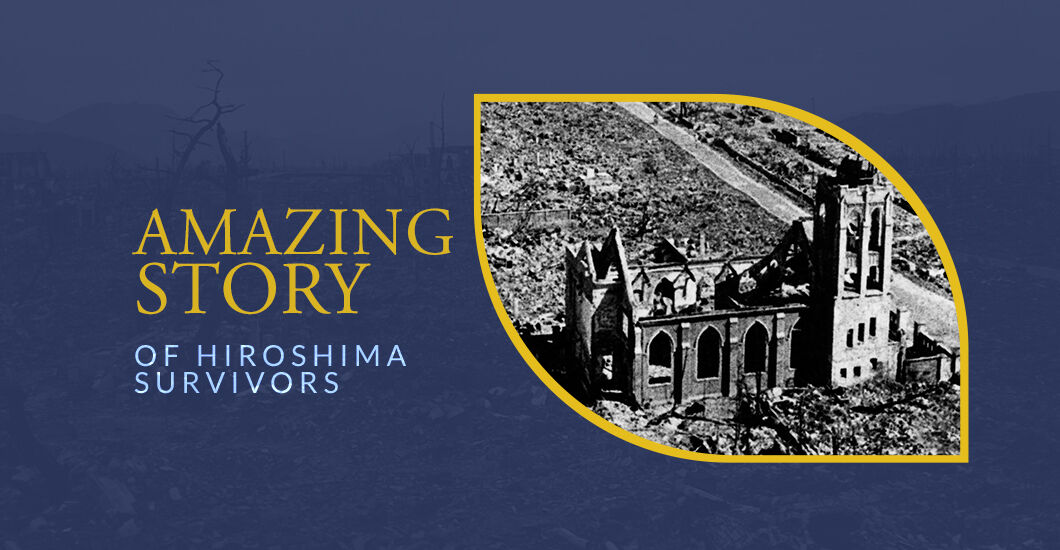
On August 6, 1945 during World War II, an atomic bomb was dropped on the town of Hiroshima, Japan. 140,000 people were killed or injured. In the midst of the devastation, near the hypocenter of the attack, eight Jesuit missionaries who were in their rectory survived.
None suffered hearing loss from the explosion. Their church, Our Lady of the Assumption, suffered the destruction of its stained glass windows but did not fall; it was one of only a few buildings left standing in the midst of widespread destruction.
Not only were the clerics kept safe from the initial blast — they suffered no ill effects from the harmful radiation. Doctors who cared for them after the blast warned that radiation poisoning to which they had been exposed would cause serious lesions, illness and even death. But 200 medical exams in the ensuing years showed no ill effects, confounding the doctors who had predicted dire consequences.
Father Schiffer, who was only 30 years old when the bomb was dropped on Hiroshima, told his story 31 years later, at the Eucharistic Congress in Philadelphia in 1976. At the time, all eight members of the Jesuit community who had lived through the bombing were still alive. Before the gathered faithful, he reminisced about celebrating Mass in the early morning, then sitting down in the rectory kitchen for breakfast. He had just sliced and dug his spoon into a grapefruit when there was a bright flash of light. At first, he thought it might be an explosion in the nearby harbour. Then he described the experience:
“Suddenly, a terrific explosion filled the air with one bursting thunder stroke. An invisible force lifted me from the chair, hurled me through the air, shook me, battered me, whirled me round and round like a leaf in a gust of autumn wind.”
Next thing he remembered was that he opened his eyes and found himself on the ground. He looked around, and saw there was nothing left in any direction: the railroad station and buildings in all directions were gone.
Not only did they all survive with (at most) relatively minor injuries, but they all lived well past that awful day with no radiation sickness, no loss of hearing, or any other visible long term defects or maladies. Asked why they believe they were spared, when so many others died either from the explosion or from the subsequent radiation, Father Schiffer spoke for himself and for his companions:
“We believe that we survived because we were living the message of Fatima. We lived and prayed the Rosary daily in that home.”
'

God sends no one away empty-handed—except those who are full of themselves
I once heard a Taekwondo master tactfully correct a young teenage boy who was looking to be his martial arts student: “If you would like to learn martial arts from me,” he said, “you need to pour out the tea in your cup first, and then bring back the empty cup.” To me the master’s meaning was clear and concise: He didn’t want a prideful student. A cup full of tea has no space for more; no matter how good what you try to add is, it will overflow the cup. Likewise, no student can learn from even the best of masters if he is already full of himself. As my eyes followed the young man walking away in indignation, I told myself that I would never fall into that prideful trap. Yet a few years later, I found myself bringing a cup brimming with bitter tea to God—my Master.
Full to the Brim
I was assigned to teach religion to PreK to second grade students at a small Catholic school in Texas. I received that assignment from my religious superior with bitterness and discouragement. For me, the reason was quite understandable: I had completed my Master of Theology degree, because I wanted to become a college professor in Sacred Scripture, and later, a sought-after public speaker. This assignment clearly did not meet my expectations and required so much less of me than what I thought I could give. In tears I fell prostrate onto the convent’s chapel floor and lay there for a long time. How can I bring myself to teach a bunch of little children? How can I benefit from working among kids? Indeed, my teacup was full to the brim. But even in my pride, I could not bear to walk away from my Master. The only way out was to beg Him for help.
The Master saw me through and through and was ready to help me drain my teacup so he could fill it with more tasteful tea. Ironically, he chose to use the very children put in my charge to teach me humility and empty my cup of pride. To my surprise, I began to realize that the children were budding, little theologians. Regularly, their questions and remarks gave me greater understanding and insights into the nature of God.
A question from four-year-old Andrew brought a surprising result: “How can God be inside of me?” he asked. While I was organizing my thoughts and preparing a sophisticated theological answer, little Lucy replied without a moment’s hesitation, “God is like air. He is everywhere.” Then she took a deep breath to show how like air God could be inside her.
Trained by True Master
God not only used the children to help me empty my cup, but also to teach me ‘martial arts’ for my spiritual battles. While watching a short video about the story of the Pharisee and the tax collector, little Matthew broke down in tears. When I asked, he humbly admitted, “I bragged the other day that I had shared my ice cream with my friend.” His words reminded me to remain on guard against the sin of pride. By the end of the year, I had learned that as I emptied my teacup, God was filling it with Himself instead. Even the children told me so. One day, Austin sneakily asked, “Sister, what is the Bible?” Not waiting for an answer, he pointed at me: “You are the Bible,” he said. I was a bit shocked and confused but little Nicole supplied the explanation, “Because you are all about God,” she said. It was through the children that God poured new tea into my cup.
Many of us go to God asking Him to teach us how to fight our spiritual battles without realizing our cup is too full of pride to have room for His teaching. I have learned that it is easier to bring an empty cup and ask our master to fill it with His own life and wisdom. Let’s allow the true master to train us and give us exercises for our life journey and for the battles we will inevitably fight. He may surprise us and use little children, or others we think little of, to teach us, but let us remember that “God chose the lowly and despised of the world, those who count for nothing, to reduce to nothing those who are something, so that no human being might boast before God” (1 Corinthians 1:28-29).
'